

Patterns of Value Change During the Life Span. Some Evidence From a Functional Approach to Values Abstract Little research has examined mean-level change in values across the life span.
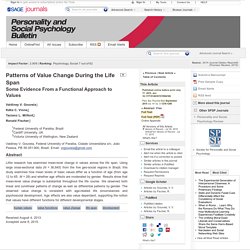
Using large cross-sectional data (N = 36,845) from the five geo-social regions in Brazil, this study examines how mean levels of basic values differ as a function of age (from age 12 to 65; M = 28) and whether age effects are moderated by gender. Results show that mean-level value change is substantial throughout the life course. We observed both linear and curvilinear patterns of change as well as differential patterns by gender. Article Notes. Counterfactuals, Knowledge, and Blame. By: Elizabeth Gilbert When things go wrong, people look for someone to blame—but whom, how much, and why?

We blame others more when they cause the bad outcome (he crashed my car is more blameworthy than he was hit while driving my car). And we blame others more when they intend a bad outcome (he crashed my car on purpose is more blameworthy than it being an accident). Under the law, legal responsibility is generally based on these two separate “elements”: (1) whether you actually caused the outcome (actus reas, for example, did you crash the car); and (2) your mental state (e.g., intent, knowledge) when the outcome occurred (mens rea, for example, did you do it on purpose).
The law asks people to consider these factors separately, but people might not be doing what the law asks of them. Fifty psychological and psychiatric terms to avoid: a list of inaccurate, misleading, misused, ambiguous, and logically confused words and phrases. “If names be not correct, language is not in accordance with the truth of things.”

(Confucius, The Analects) Scientific thinking necessitates clarity, including clarity in writing (Pinker, 2014). In turn, clarity hinges on accuracy in the use of specialized terminology. Clarity is especially critical in such disciplines as psychology and psychiatry, where most phenomena, such as emotions, personality traits, and mental disorders, are “open concepts.” Open concepts are characterized by fuzzy boundaries, an indefinitely extendable indicator list, and an unclear inner essence (Pap, 1958; Meehl, 1986). The hormones testosterone and cortisol influence unethical behavior, study finds. Hormones play a two-part role in encouraging and reinforcing cheating and other unethical behavior, according to research from Harvard University and The University of Texas at Austin.

With cheating scandals a persistent threat on college campuses and financial fraud costing businesses more than $3.7 trillion annually, UT Austin and Harvard researchers looked to hormones for more answers, specifically the reproductive hormone testosterone and the stress hormone cortisol. According to the study, the endocrine system plays a dual role in unethical acts. First, elevated hormone levels predict likelihood of cheating. Then, a change of hormone levels during the act reinforces the behavior. 02699931.2015.1050357# 10508422.2015.1028548# Evolutionary Psychology 2.0. Alexithymia increases moral acceptability of accidental harms. Is required if these outputs are to influence thefinal moral judgement and failure in integrationcan cause people to rely more on causal heuristics(Buon, Jacob, Loissel, & Dupoux, 2013), e.g.patients who have had complete and partialcallosotomy surgery tend to rely more on theoutcome information because information aboutmental states of the agent is not properly inte-grated while making the moral judgement (Milleret al., 2010). 1.3.
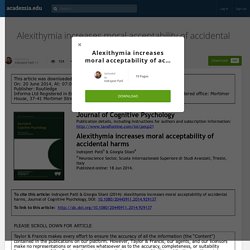
Attempted versus accidental harmand evidence for the two-process model. Cell. To view the full text, please login as a subscribed user or purchase a subscription.
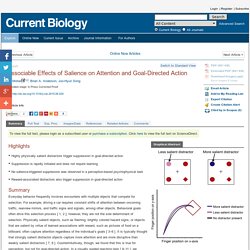
Click here to view the full text on ScienceDirect. Figure 1 Stimuli and Data from Experiment 1 (A) A sample sequence of trials from experiment 1. Participants were required to point to the unique shape. How to Cope With an Existential Crisis. The causal cognition of wrong doing: incest, intentionality, and morality. Department of Anthropology, London School of Economics and Political Science, London, UK The paper concerns the role of intentionality in reasoning about wrong doing.
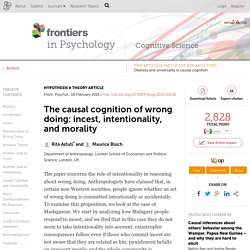
Anthropologists have claimed that, in certain non-Western societies, people ignore whether an act of wrong doing is committed intentionally or accidentally. To examine this proposition, we look at the case of Madagascar. We start by analyzing how Malagasy people respond to incest, and we find that in this case they do not seem to take intentionality into account: catastrophic consequences follow even if those who commit incest are not aware that they are related as kin; punishment befalls on innocent people; and the whole community is responsible for repairing the damage.
Are You a Head Person or a Heart Person? Imagine meeting a stranger and having a chance to learn what sort of person they are by asking just one question.
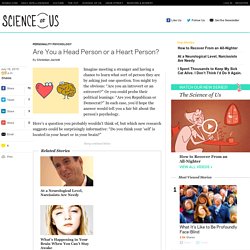
You might try the obvious: “Are you an introvert or an extrovert?” Or you could probe their political leanings: “Are you Republican or Democrat?” In each case, you’d hope the answer would tell you a fair bit about the person’s psychology. Here’s a question you probably wouldn’t think of, but which new research suggests could be surprisingly informative: “Do you think your ‘self’ is located in your heart or in your brain?” There’s some recent research history to this question: A series of studies published in 2013 asked this question to hundreds of undergrad students at North Dakota State University. Other studies in the series found that people who saw their self as located in their brain tended to perform better on general-knowledge tests and to react less emotionally to stress. The Unifying Moral Dyad. Liberals and Conservatives Share the Same Harm-Based Moral Template Kurt Gray, Department of Psychology, The University of North Carolina at Chapel Hill, Chapel Hill, NC 27599, USA.
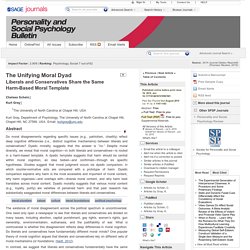
Email: kurtgray@unc.edu Abstract Do moral disagreements regarding specific issues (e.g., patriotism, chastity) reflect deep cognitive differences (i.e., distinct cognitive mechanisms) between liberals and conservatives? Dyadic morality suggests that the answer is “no.” The existence of moral disagreement across the political spectrum is uncontroversial. The Role of Self-Sacrifice in Moral Dilemmas.
Abstract Centuries’ worth of cultural stories suggest that self-sacrifice may be a cornerstone of our moral concepts, yet this notion is largely absent from recent theories in moral psychology.
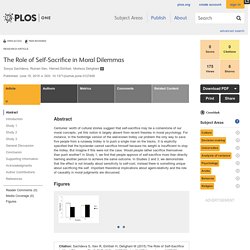
For instance, in the footbridge version of the well-known trolley car problem the only way to save five people from a runaway trolley is to push a single man on the tracks. It is explicitly specified that the bystander cannot sacrifice himself because his weight is insufficient to stop the trolley. But imagine if this were not the case. Would people rather sacrifice themselves than push another? Approach and avoidance in moral psychology: Evidence for three distinct motivational levels. Columbia University, Department of Psychology, 406 Schermerhorn Hall, 1190 Amsterdam Ave. MC 5501, New York, NY 10027, United States Received 3 March 2015, Revised 30 May 2015, Accepted 5 June 2015, Available online 20 June 2015 Choose an option to locate/access this article: Check if you have access through your login credentials or your institution Check access doi:10.1016/j.paid.2015.06.012.
Moral Vitalism: Seeing Good and Evil as Real, Agentic Forces. A preliminary taxonomy of the voices inside your head. Psychologists are taking an increasing interest in the way we all speak to ourselves in our heads. Unpleasant, uncontrollable inner voices can be a feature of mental illness, but private self-talk is a mundane part of most healthy people's consciousness. When we talk to ourselves in our heads in this way, it's common for there to be a kind of dialogue. Consider how "You" might say to yourself that you want to stop working, but then a voice in your head takes a different stance and urges you to continue. Ethics and Psychology: Deontic and instantive morality. John Stuart Mill, Speech in Favor of Capital Punishment.
John Stuart Mill "Speech In Favor of Capital Punishment" About the Author: John Stuart Mill (1806-73) is one of the foremost representative of utilitarian thought as well as one of the most influential of nineteenth century liberals. Influenced by Harriet Taylor (his wife), Mill developed a very humane version of utilitarianism that was sympathetic to women's rights, labor unions, proportional representation, and other liberal themes. His major works include On Liberty (1859), Principles of Political Economy (1848), Utilitarianism (1863), and his Autobiography (1873).
For more information about John Stuart Mill and utilitarianism, see the Utilitarianism page of Ethics Updates. About the Article: This speech was given before Parliament on April 21, 1868 in opposition to a bill banning capital punishment that had been proposed by Mr. Ethics and Psychology: Errors in Moral Forecasting. On why hypocrisy thrives: Reasonable doubt created by moral posturing can deter punishment. A University of Helsinki, Swedish School of Social Science, Snellmaninkatu 12, 00014 Helsinki, Finlandb University of Cologne, Department of Corporate Development and Business Ethics, Albertus-Magnus-Platz, 50923 Cologne, Germany Received 23 January 2015, Revised 17 April 2015, Accepted 17 April 2015, Available online 18 April 2015 Choose an option to locate/access this article: Check if you have access through your login credentials or your institution.
Brutality Under Cover of Ambiguity. Activating, Perpetuating, and Deactivating Covert Retributivism Abstract Five studies tested four hypotheses on the drivers of punitive judgments. Study 1 showed that people imposed covertly retributivist physical punishments on extreme norm violators when they could plausibly deny that is what they were doing (attributional ambiguity).
Studies 2 and 3 showed that covert retributivism could be suppressed by subtle accountability manipulations that cue people to the possibility that they might be under scrutiny. Studies 4 and 5 showed how covert retributivism can become self-sustaining by biasing the lessons people learn from experience. Article Notes. Optimism and pessimism are separate systems influenced by different genes. "... the optimist sees the rose and not its thorns; the pessimist stares at the thorns, oblivious to the rose,” Kahlil Gibran. Don’t try to cure anxiety: we need it – Charlie Kurth. At a dinner party, you find yourself seated next to a man named Sam. Select Publications. The Moral Bucket List. Photo ABOUT once a month I run across a person who radiates an inner light. Living Comfortably with Hypocrisy and Negative Evidence. The Google Define:Hypocrisy command returns the following definition: “the practice of claiming to have moral standards or beliefs to which one’s own behavior does not conform; pretense”.
Hypocrisy can be conscious or unconscious. People can be aware that their beliefs are contradicted by their daily behavior or not. In this latter case, hypocrisy is often obvious to observers. Moral decisions can be manipulated by eye tracking technology, study finds. Moral decisions can be influenced by tracking moment to moment movements of the eyes during deliberation, finds new research from Lund University, Sweden, University College London and University of California Merced.
Psychology Scales - Stephen Reysen. Likability ScaleThe likability scale measures the perceived likability of a target individual. Untitled. Psycnet.apa. System maintenance time on Sunday, 03/15/2015 from 7:00 AM until 9:00 AM Eastern Time. All APA databases will be unavailable during that time. PsycNET - Display Record. Fueling doubt and openness: Experiencing the unconscious, constructed nature of perception induces uncertainty and openness to change.
Ethics and Psychology: Online processing of moral transgressions: ERP evidence for spontaneous evaluation. Cooperate without looking: Why we care what people think and not just what they do. Online processing of moral transgressions: ERP evidence for spontaneous evaluation. Interpersonal Instrumental Emotion Regulation. The Ethics of Human Rights (91): Moral Realism vs Moral Subjectivism. From moral concern to moral constraint. Punishment, Consequentialism, and the Appeal of Retribution. Cognitive biases can affect moral intuitions about cognitive enhancement. PsycNET - Display Record. PsycNET - Display Record. Liberals Think More Analytically (More “WEIRD”) Than Conservatives. How Emotions Shape Moral Behavior: Some Answers (and Questions) for the Field of Moral Psychology - Teper - 2015 - Social and Personality Psychology Compass.
Testing the Prosocial Effectiveness of the Prototypical Moral Emotions: Elevation Increases Benevolent Behaviors and Outrage Increases Justice Behaviors. (2) Not like me = bad: Infants prefer those who harm dissimilar others. (2) Moral judgment and action in preverbal infants and toddlers: Evidence for an innate moral core. SMART-ER: a Situation Model of Anticipated Response consequences in Tactical decisions in skill acquisition — Extended and Revised. The Neuroscience of Implicit Moral Evaluation and Its Relation to Generosity in Early Childhood: Current Biology.
The truth about free will: Does it actually exist? Is applied ethics applicable enough? Acting and hedging under moral uncertainty. Left vs Right (World) What Kinds of Value Motives Guide People in Their Moral Attitudes? The Role of Personal and Prescriptive Values at the Culture Level and Individual Level. Getting Humanism Right-Side Up.
Subjective and Objective Hierarchies and Their Relations to Psychol... Behold, atheists' new Ten Commandments. (2) Rutjens, B. T., van Harreveld, F., & van der Pligt, J. (2013) Step by step: Finding compensatory order in science. Current Directions in Psychological Science. PsycNET - Display Record. (2) ‘Utilitarian’ judgments in sacrificial moral dilemmas do not reflect impartial concern for the greater good. (2) What is the price of escaping the vat? Externalism, self-knowledge, and cognitive science. (2) Can science tell us what's objectively true? How Theories of Well-Being Can Help Us Help. Sign In. Do humans make good decisions?: Trends in Cognitive Sciences.
Conforming to coordinate: Children use majority information for peer coordination - Grueneisen - 2014 - British Journal of Developmental Psychology. Another Look at Moral Foundations Theory: Do Authoritarianism and Social Dominance Orientation Explain Liberal-Conservative Differences in “Moral” Intuitions? Parable of the Polygons - a playable post on the shape of society. What we say and what we do: The relationship between real and hypothetical moral choices. A Neural Mechanism for Nonconscious Activation of Conditioned Placebo and Nocebo Responses. The tree to the left, the forest to the right: Political attitude a...
Psychology & Religion: People with a Purpose. On Scientific Morality. The Psychological Advantage of Unfalsifiability: The Appeal of Unte... Affordances and the musically extended mind. The ecology of religious beliefs. Implicit Associations Have a Circadian Rhythm. The Moral Instinct. Practical Ethics Bites. Best of Epiphenom 2007-2014. Philosophy of Science, Vol. 18, No. 2 (Apr., 1951), pp. 132-143. Infants Can Tell If You’re a Reliable Informant. A general approach – avoidance hypothesis of Oxytocin: Accounting for social and non-social effects of oxytocin.
The Psychological Comforts of Storytelling. PsycNET - Display Record. The Great Psychoanalysts: Anna Freud. Consonance and Dissonance: Political Science Evidence. Exploring the connection between empathy, neurohormones and aggression. PsycNET - Display Record. The Emotional Roots of Conspiratorial Perceptions, System Justification, and Belief in the Paranormal. Personality and Individual Differences.
A renewal of ethics - Vol. 26, Part 11 ( November 2013) How America Can Finally Learn to Deal With Its Impulses. The Life of the Mind: Hannah Arendt on Thinking vs. Knowing and the Crucial Difference Between Truth and Meaning. PsycNET - Display Record. Two Faces of Group-Based Shame. 100% online Master of Public Health (MPH) - The University of Roehampton, London. Hume on Is and Ought.